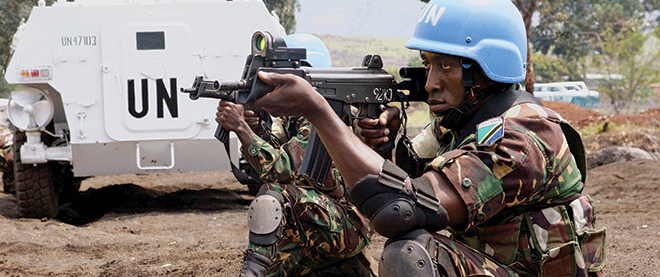The UN’s turning point
Long a passive body, the UN heads into the battlefield in the DRC
Reuters
Share

There is good news coming out of the Democratic Republic of the Congo (DRC), a result of an unprecedented decision made by the United Nations to go on the offensive in the fight against armed groups. For the first time, the UN has created an offensive combat intervention brigade, a 3,000-strong force authorized to use “all necessary measures” to prevent the expansion of armed groups by neutralizing and disarming them. “It is high time to try another option,” says Thierry Vircoulon, Central Africa director at the International Crisis Group, a non-profit organization dedicated to ending conflict. “I don’t think we created the UN to be a passive observer in the middle of the battlefield.”
The UN has been in the DRC for 14 years, where approximately 20,000 military personnel are stationed, with an annual budget of $1.5 billion devoted to peacekeeping operations. After an embarrassing rebel takeover of Goma, a lakeside city near the border of Rwanda, in November 2012, the UN’s credibility in the country was called into question. “There was a lot of frustration and protests against the UN,” says Joseph Kay, an English freelance journalist living in Goma. “Everything was incredibly tense.” The takeover, which saw Congolese and blue-hatted UN troops watch helplessly as rebels rolled into town, demanded a radical change in strategic tack. In March, the UN Security Council authorized an all-African intervention brigade, made up of troops from South Africa, Malawi and Tanzania. Five months later, the brigade saw action just outside Goma.
“Bombs were landing at the airport and in the town,” said Lt.-Gen. Derrick Mgwebi, a South African defence force official on Aug. 30 at a media briefing. “Bombs were falling left and right.” The brigade retook territory, a ceasefire was declared, and peace talks that had been held in Kampala, the capital of Uganda, resumed between the M23 rebels and the DRC government. “We’re trying to send a message to the M23 [March 23 Movement, a notorious rebel group] that, this time around, you’re not going to see Goma,” threatened Mgwebi. “Don’t venture in ideas of taking over again.”
Analysts say the early battles are encouraging. “The August and September engagements, and subsequent forcing of M23 out of Kibati heights, was an important victory, and ensured a blanket of security was thrown over Goma and surrounding areas,” says John Stupart, managing editor of the African Defence Review, a news organization focused on security. “If the brigade can secure and hold the eastern DRC against rebels indefinitely, with minimum casualties to civilians and its own forces, this creates a great model for the UN to build upon.”
It is too early to say whether the intervention brigade can live up to its mandate, which expires in March 2014. Not only are they fighting the M23, but a collection of other armed groups, some supported by neighbouring Rwanda and Uganda. “Any sort of inactivity or military loss against M23 or any other group would be close to a worst-case scenario,” says Christoph Vogel, a DRC analyst affiliated with the University of Zurich, in Switzerland. Even if the mission goes as planned, Vogel points out there are ethical problems with peacekeepers having an offensive mandate in countries where no side is more legitimate than the other. (For example, the Congolese troops the UN is supporting are also known as perpetrators of human rights abuses.) “The offensive mandate counters the peacekeeping pillar of impartiality,” says Vogel, “it’s a very thin line on which the brigade is walking right now.”
Still, he says, the UN has few options. “This is a shift in peacekeeping doctrine,” he says. “This could be a turning point where the UN sees that more robust action is needed to address conflicts.” Vircoulon agrees. “Depending on the final results, the brigade may bring an interesting alternative to the passive and expensive UN missions,” he says. However, he cautions, “there is no magic bullet.”